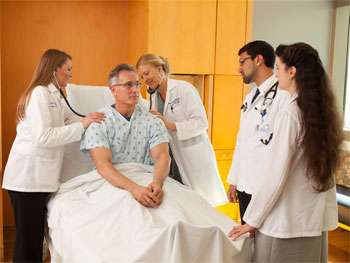Training Programs

Pulmonary and Critical Care Medicine Fellowship Program
The Fellowship in Pulmonary and Critical Care Medicine is a leader in fellowship training. We develop future academic leaders, innovators, and educators who reflect the compassion, diversity and excellence we value at UCLA.
Pulmonary & Critical Care Medicine Fellowship Training >
Sleep Medicine Fellowship Program
The UCLA Multi-Campus Sleep Medicine Fellowship Program trains bright and compassionate clinicians and researchers through a rigorous training program. The program currently includes 5 clinical training sites.
Sleep Medicine Fellowship Training >
Interventional Pulmonology Fellowship Program
The Association of Interventional Pulmonology Program Directors was established to set the standard for high quality, patient centered, evidence based training in the field of minimally invasive diagnostic and therapeutic procedures of the thorax.
Interventional Pulmonology Fellowship Training >
Clinical Allergy & Immunology Fellowship Program
The Allergy & Immunology Fellowship is a two to three-year program. We admit trainees from both Pediatric and Internal Medicine residency programs. Our fellowship program features diverse clinical and research training.
Clinical Allergy & Immunology Fellowship Training >
Lung Transplant Fellowship Program
The UCLA Lung Transplant Fellowship is a specialized one-year program dedicated to training in transplant pulmonology within the UCLA Lung Transplant Program.
Lung Transplant Fellowship Training >